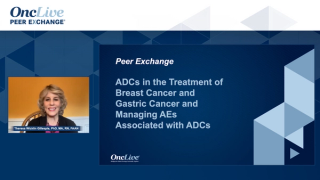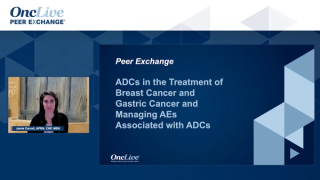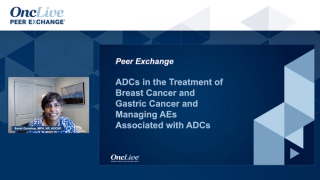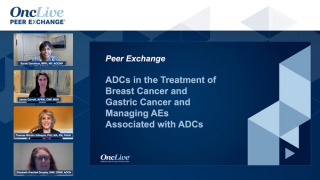
Gastrointestinal Cancer
Latest News
Latest Videos

More News

This retrospective review demonstrates the increased use of active surveillance in patients with small nonfunctional pancreatic neuroendocrine tumors.

Developing a strong working relationships and understanding the physical and emotional demands of the oncology specialty are some ways nurses can address burnout, an expert said.

Findings from the RATIONALE-306 trial support treatment of tislelizumab plus chemotherapy for PD-L1-positive ESCC.

The fast track status from the FDA is supported by findings from a phase 1 trial in glioblastoma, which demonstrated the overall survival benefit from DOC1021.

The overall survival rate in patients with advanced biliary tract cancer treated with durvalumab plus chemotherapy was nearly double the rate of those treated with chemotherapy alone.

Disease-free survival and overall survival improved with celecoxib plus advanced chemotherapy in patients with PIK3CA-mutated stage III colon cancer.

Monotherapy with IBI343 received fast track designation from the FDA for advanced unresectable or metastatic pancreatic ductal adenocarcinoma.

Perioperative chemotherapy with FLOT improved overall survival in patients with resectable esophageal cancer compared with neoadjuvant chemoradiation with CROSS.

Six-year administration of imatinib maintenance therapy—compared with the standard 3 years—improved disease-free survival in gastrointestinal stromal tumors.

The accelerated approval of infigratinib has been withdrawn by the FDA for previously treated, FGFR2-positive, advanced cholangiocarcinoma.

The BLA for zenocutuzumab to treat NRG1-positive non–small cell lung cancer and pancreatic cancer received priority review from the FDA.

Frontline treatment with pembrolizumab plus trastuzumab/chemotherapy significantly and meaningfully improved overall survival in HER2-positive, unresectable or metastatic gastric/GEJ cancer.

The FDA granted fast track designation to CTX-009 plus paclitaxel for pretreated metastatic or locally advanced biliary tract cancer.

Trastuzumab-strf was approved for HER2-overexpressing breast cancer and HER2-overexpressing metastatic gastric or GEJ adenocarcinoma.

A pilot study proved that a nurse-coordinated approach shows promise in treating more than just 1 symptom among patients with cancer.

Older patients with cancer demonstrated a moderate to high symptom burden, leading to the need for routine symptom assessments and tailored management interventions.

Lutetium Lu 177 dotatate was approved by the FDA for children aged 12 years and older with somatostatin receptor-positive gastroenteropancreatic neuroendocrine tumors.

Superior 3-year survival outcomes were observed with durvalumab plus chemotherapy compared with chemotherapy alone in patients with advanced biliary tract cancer.

Differences in gut microbiome signatures may lead to more accurate treatments and diagnoses for patients with colorectal cancer.

The safety label for fluorouracil products will now include information about the agent’s use in patients with dihydropyrimidine dehydrogenase deficiency.

An expert discusses how radiation may improve quality of life in patients with rectal cancer, in addition to when radiation or surgery could be omitted.

The use of nivolumab plus chemotherapy as a standard frontline treatment has been supported by recent data from the phase 3 CheckMate 649 trial for patients with gastric, gastroesophageal junction, and esophageal adenocarcinoma.

Oncology nurses can advocate for patients with cholangiocarcinoma to participate in on-going clinical trials with tinengotinib.

Oncology nurses can assist patients in understanding the significance of KRAS mutation testing and its treatment implications.

A treatment for NTRK-positive locally advanced or metastatic solid tumors, repotrectinib, is currently under priority review by the FDA and may address a high unmet medical need.














































